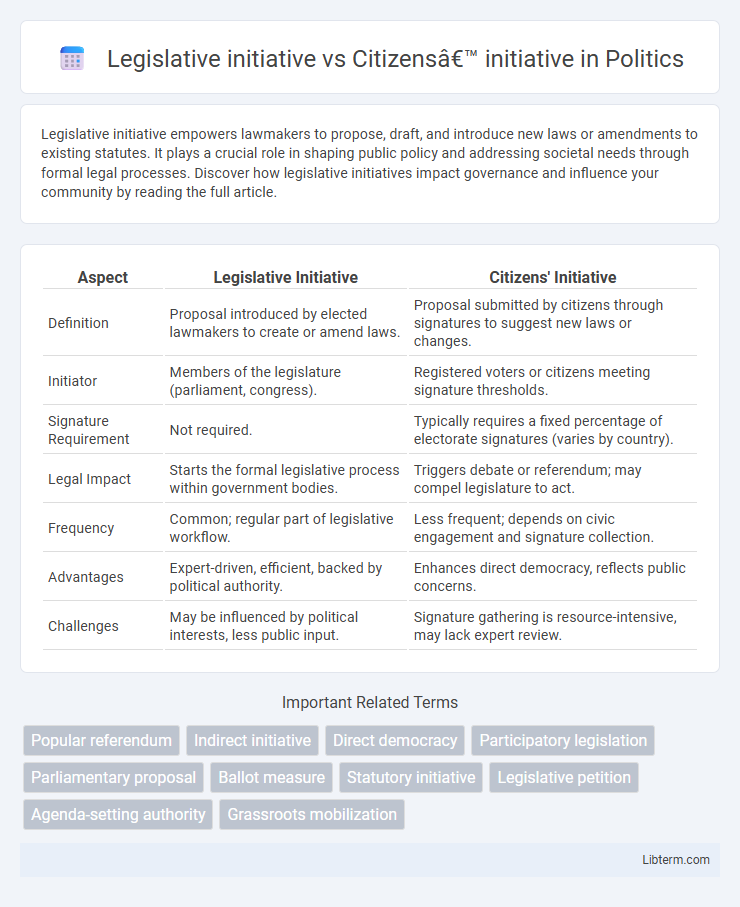Legislative initiative empowers lawmakers to propose, draft, and introduce new laws or amendments to existing statutes. It plays a crucial role in shaping public policy and addressing societal needs through formal legal processes. Discover how legislative initiatives impact governance and influence your community by reading the full article.
Table of Comparison
| Aspect | Legislative Initiative | Citizens' Initiative |
|---|---|---|
| Definition | Proposal introduced by elected lawmakers to create or amend laws. | Proposal submitted by citizens through signatures to suggest new laws or changes. |
| Initiator | Members of the legislature (parliament, congress). | Registered voters or citizens meeting signature thresholds. |
| Signature Requirement | Not required. | Typically requires a fixed percentage of electorate signatures (varies by country). |
| Legal Impact | Starts the formal legislative process within government bodies. | Triggers debate or referendum; may compel legislature to act. |
| Frequency | Common; regular part of legislative workflow. | Less frequent; depends on civic engagement and signature collection. |
| Advantages | Expert-driven, efficient, backed by political authority. | Enhances direct democracy, reflects public concerns. |
| Challenges | May be influenced by political interests, less public input. | Signature gathering is resource-intensive, may lack expert review. |
Introduction to Legislative and Citizens’ Initiatives
Legislative initiatives allow elected representatives to propose new laws or amendments within parliamentary frameworks, shaping policy through formal legislative processes. Citizens' initiatives enable the public to directly propose legislation or constitutional amendments by gathering a required number of signatures, fostering participatory democracy and grassroots involvement. Both mechanisms serve as essential democratic tools, with legislative initiatives driven by lawmakers and citizens' initiatives empowered by popular support.
Defining Legislative Initiative
Defining legislative initiative involves understanding the formal process by which elected representatives propose new laws or amendments within a parliamentary framework. This process is typically reserved for members of the legislature, allowing them to draft, submit, and advocate for legal changes through structured debates and votes. In contrast, citizens' initiative enables the public to directly propose legislation by gathering a required number of signatures, thereby bypassing traditional legislative sponsorship and fostering participatory democracy.
What is a Citizens’ Initiative?
A Citizens' Initiative is a democratic process that allows citizens to propose new laws or policy changes by gathering a required number of signatures to bring the proposal to a legislative body or public vote. Unlike legislative initiatives, which originate from elected representatives or government officials, citizens' initiatives empower the public to directly influence legislation and governance. This mechanism enhances participatory democracy by enabling grassroots involvement in the lawmaking process.
Legal Framework and Jurisdiction
Legislative initiatives are proposals introduced by elected representatives within parliament or other legislative bodies, governed primarily by national constitutional and statutory legal frameworks that define their scope, procedures, and jurisdictional limits. Citizens' initiatives are mechanisms allowing the general public to propose new laws or amendments, operating under specific legal statutes that regulate signature collection thresholds, submission processes, and validation criteria, often subject to regional or national jurisdictional rules. Both initiatives function within a legal framework that establishes jurisdiction boundaries, procedural requirements, and institutional oversight to ensure legitimacy and compliance with democratic principles.
Key Differences Between Legislative and Citizens’ Initiatives
Legislative initiatives are proposals introduced by elected representatives within the legislative body, often requiring fewer procedural hurdles and focusing on policy areas set by lawmakers. Citizens' initiatives enable voters to propose laws or amendments directly by gathering a mandated number of signatures, bypassing the legislature to increase public participation and influence. The key differences lie in the originator of the proposal, the procedural requirements for qualification, and the level of direct public involvement in the lawmaking process.
Advantages of Legislative Initiatives
Legislative initiatives benefit from expert drafting and thorough legal review, ensuring proposals are precise, coherent, and aligned with existing laws. They often have higher chances of success due to political backing from elected representatives and established institutions. These initiatives contribute to a more efficient lawmaking process by streamlining debates and reducing the likelihood of conflicting or redundant regulations.
Benefits of Citizens’ Initiatives
Citizens' initiatives empower individuals to directly propose and influence legislation, enhancing democratic participation beyond representative bodies. This mechanism increases public engagement by allowing citizens to address issues often overlooked by elected officials, fostering greater accountability and transparency. The process also promotes diverse perspectives, ensuring that grassroots concerns are formally recognized and debated within the legislative framework.
Challenges and Criticisms
Legislative initiatives often face challenges such as bureaucratic delays and political resistance, limiting their responsiveness to public demands. Citizens' initiatives are criticized for potential manipulation by special interest groups and difficulties in meeting signature requirements, which can undermine their democratic intent. Both face scrutiny over transparency and inclusiveness, impacting the effectiveness and legitimacy of the policymaking process.
Real-World Examples and Case Studies
Legislative initiatives often emerge from elected representatives, exemplified by the European Union's legislative proposals spearheaded by the European Commission, which undergo rigorous parliamentary scrutiny before adoption. Citizens' initiatives empower the public to propose laws directly, as demonstrated by Switzerland's frequent use of referendums where citizens have successfully influenced policies on issues like immigration and environmental protection. In the United States, states such as California showcase the impact of citizens' initiatives, with landmark measures like Proposition 13 reshaping property tax laws through popular vote.
Future Trends and Implications
Legislative initiatives primarily driven by elected officials increasingly integrate digital platforms, enhancing transparency and accelerating policy responsiveness, while citizens' initiatives leverage social media and grassroots mobilization to amplify public influence in governance. Emerging trends indicate a convergence where hybrid models enable collaborative lawmaking, fostering participatory democracy and empowering diverse stakeholder engagement. This evolution implies a future with more adaptive legal frameworks, greater civic empowerment, and potential challenges in balancing expert input with popular demand.
Legislative initiative Infographic

 libterm.com
libterm.com